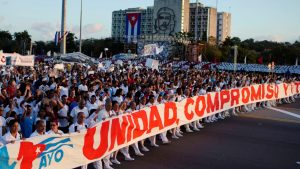By: Richard Perez, 2L

People carry a banner reading “Union, Commitment and Victory” during a May Day rally in Havana, Cuba May 1, 2019. REUTERS/Alexandre Meneghini
Cuban bank “Banco Núñez” had twenty-two branches and controlled $105 million in assets in 1958. Two years later, the bank was confiscated by Fidel Castro’s regime and absorbed by the newly established National Bank of Cuba. Descendants of the former owners of Banco Núñez are now suing French Bank Société Générale for $792 million for allegedly “trafficking” with their property, now part of the National Bank of Cuba.
This lawsuit is one of several recently filed by property claimants in the United States whose property was expropriated without compensation by Castro’s communist regime. The lawsuits follow the Trump administration’s decision to lift the suspension on Title III of the Helms-Burton Act. On April 17, 2019, the Trump administration lifted the suspension in its effort to intensify the pressure on both Nicolas Maduro’s regime in Venezuela and countries perceived of supporting it. Among other rights, the act affords property claimants in the United States a private right to sue businesses that are benefiting from their confiscated property. This particular remedy had been suspended for the past twenty-three years to avoid conflicts with allies such as Canada and the European Union, because their businesses invested billions in Cuba.
Many have been waiting decades for the revival of this remedy. One attorney representing the fourteen grandchildren of the former owners of Banco Núñez believes that Title III is their “vehicle to get justice.” However, a broader analysis reveals that this vehicle may fail to reach its destination while creating some undesired consequences en route. The decision to lift the suspension of Title III is opposed by our Canadian and European allies due to their respective financial endeavors with the island nation. Notably, these nations have previously implemented “blocking” statutes—preventing the United States from going after foreign assets in those countries. Additionally, these statutes permit businesses sued under Title III to file counterclaims. As a result, these complex, contentious feuds will likely be litigated well into the future if not initially settled. We may never predict the future of these lawsuits suits if the president decides to exercise his or her authority to reactive the suspension of Title III.
Lifting the suspension also carries the potential to trigger retaliatory procedures against American companies. Derivative ramifications, such as impeding international trade, may subsequently follow. If materialized, these implications effectively undermine a separate objective of the Helms-Burton Act—to provide Cuba with economic assistance in order to establish a democratic government. Barring commercial entities from conducting business with Cuba merely adds salt to an already gaping socioeconomic wound that America purports to mend with the Helms-Burton Act. Moreover, Title III carries domestic consequences. American companies are not exempt from Title III suits. In an effort to keep up with the costs of prolonged litigation, these companies may pass the costs on to the consumer, terminate positions, or even completely derail any hopes to remain financially solvent.
These encumbrances are not readily apparent when looking through a lens with a narrow administrative purpose. As a general matter, we must all zoom out and look at the bigger picture in order to ascertain the detrimental implications that this revival creates. In our convoluted world, the effects of a legal decision do not create a linear causal chain but rather a stream of multifaceted twists and turns that require a broader cost-benefit analysis.




